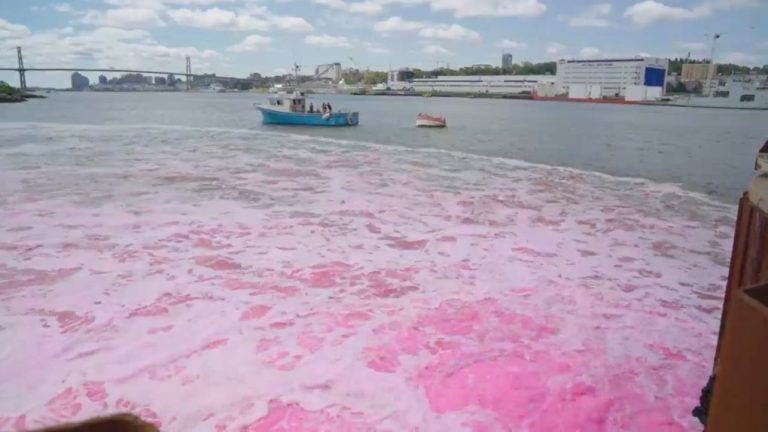Researchers in Nova Scotia are dyeing the Halifax Harbour pink as part of long-term research project that could help reverse some of the world’s greenhouse gas emissions.
Dalhousie University, along with the organization Planetary Technologies, released 500 litres of a safe, pink fluorescent dye into the harbour to see how far it will travel.
The move is the first step, says Katja Fennel, an oceanographer at Dalhousie, before researchers release alkaline material into the water this fall.
That material will effectively act as an antacid for the ocean, helping to neutralize the additional acidic carbon dioxide being absorbed by the world’s oceans.
“The purpose is to actually induce the ocean to take up atmospheric CO2 — CO2 from the air — and help us reduce legacy carbon dioxide emissions to the atmosphere,” Fennel told CTV News.
While plants play an important role in taking up CO2 from the air, so too do the world’s oceans.
As Planetary Technologies explain on its website, rain falls from the sky and picks up CO2. As that rain falls to the Earth’s surface, the antacid in rocks neutralizes the acidity from the CO2, creating a neutralized carbon known as carbonate that in nature has helped build coral reefs, oyster shells and fish bones.
Millions of years later, the oceans now hold most of the Earth’s carbon.
Planetary Technologies says using this natural cycle as inspiration, it sources antacids used in processes such as wastewater treatment, with the aim of removing and permanently storing that CO2.
In this case, the alkaline material will be sourced from Canada and China.
“It’s a very well known substance,” Will Burt, chief ocean scientist at Planetary Technologies, told CTV News. “It’s used, it’s regulated and it’s known to be safe.”
The researchers say while alkaline could help reverse the impacts of climate change, reducing emissions remains crucial.
But if done right, Nova Scotia could become a leader in the fight against climate change, the researchers say.
“This is one of the first times, if not the first time, this has really been done to this scale in terms of a study — and the world is going to learn from what we do,” Burt said.
ctvnews


